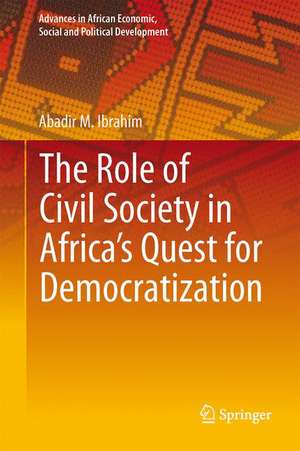The Role of Civil Society in Africa’s Quest for Democratization: Advances in African Economic, Social and Political Development, cartea 5
Autor Abadir M. Ibrahimen Limba Engleză Hardback – 7 aug 2015
Din seria Advances in African Economic, Social and Political Development
- 20%
 Preț: 562.78 lei
Preț: 562.78 lei - 18%
 Preț: 781.45 lei
Preț: 781.45 lei - 15%
 Preț: 648.56 lei
Preț: 648.56 lei - 15%
 Preț: 704.36 lei
Preț: 704.36 lei - 15%
 Preț: 640.71 lei
Preț: 640.71 lei - 15%
 Preț: 645.47 lei
Preț: 645.47 lei - 20%
 Preț: 552.24 lei
Preț: 552.24 lei - 18%
 Preț: 785.24 lei
Preț: 785.24 lei - 24%
 Preț: 694.97 lei
Preț: 694.97 lei - 15%
 Preț: 636.30 lei
Preț: 636.30 lei - 15%
 Preț: 647.08 lei
Preț: 647.08 lei - 18%
 Preț: 729.23 lei
Preț: 729.23 lei - 18%
 Preț: 891.33 lei
Preț: 891.33 lei - 18%
 Preț: 892.90 lei
Preț: 892.90 lei - 15%
 Preț: 654.43 lei
Preț: 654.43 lei -
 Preț: 391.40 lei
Preț: 391.40 lei - 15%
 Preț: 698.30 lei
Preț: 698.30 lei -
 Preț: 391.61 lei
Preț: 391.61 lei - 15%
 Preț: 642.68 lei
Preț: 642.68 lei - 18%
 Preț: 788.41 lei
Preț: 788.41 lei - 15%
 Preț: 584.43 lei
Preț: 584.43 lei - 15%
 Preț: 644.30 lei
Preț: 644.30 lei - 15%
 Preț: 642.51 lei
Preț: 642.51 lei -
 Preț: 389.88 lei
Preț: 389.88 lei -
 Preț: 432.88 lei
Preț: 432.88 lei - 15%
 Preț: 511.52 lei
Preț: 511.52 lei - 18%
 Preț: 995.83 lei
Preț: 995.83 lei - 18%
 Preț: 953.20 lei
Preț: 953.20 lei -
 Preț: 387.58 lei
Preț: 387.58 lei - 18%
 Preț: 894.34 lei
Preț: 894.34 lei - 15%
 Preț: 644.49 lei
Preț: 644.49 lei -
 Preț: 381.00 lei
Preț: 381.00 lei - 15%
 Preț: 698.62 lei
Preț: 698.62 lei - 15%
 Preț: 639.73 lei
Preț: 639.73 lei - 18%
 Preț: 897.65 lei
Preț: 897.65 lei - 15%
 Preț: 641.85 lei
Preț: 641.85 lei - 15%
 Preț: 639.37 lei
Preț: 639.37 lei -
 Preț: 392.37 lei
Preț: 392.37 lei
Preț: 382.50 lei
Nou
Puncte Express: 574
Preț estimativ în valută:
73.19€ • 76.62$ • 60.56£
73.19€ • 76.62$ • 60.56£
Carte tipărită la comandă
Livrare economică 03-09 aprilie
Preluare comenzi: 021 569.72.76
Specificații
ISBN-13: 9783319183824
ISBN-10: 3319183826
Pagini: 300
Ilustrații: XV, 213 p. 3 illus.
Dimensiuni: 155 x 235 x 17 mm
Greutate: 0.59 kg
Ediția:1st ed. 2015
Editura: Springer International Publishing
Colecția Springer
Seria Advances in African Economic, Social and Political Development
Locul publicării:Cham, Switzerland
ISBN-10: 3319183826
Pagini: 300
Ilustrații: XV, 213 p. 3 illus.
Dimensiuni: 155 x 235 x 17 mm
Greutate: 0.59 kg
Ediția:1st ed. 2015
Editura: Springer International Publishing
Colecția Springer
Seria Advances in African Economic, Social and Political Development
Locul publicării:Cham, Switzerland
Public țintă
ResearchCuprins
Chapter 1 - Conceptualizing Democracy, Democratization, and the Role of Civil Society.- Chapter 2 - The Beautiful Ones are Born: Consolidation of Democracy in South Africa and Ghana.- Chapter 3 - The Case of Nigeria: A State Stuck in Transition.- Chapter 4 - Ethiopia: A State Regressing from Democracy.- Chapter 5 - States in Transition: Some Unfinished Business.- Chapter 6 - A Comparative Analysis.- Chapter 7 – Civil Society in the Broader African Political and Social Context.- Chapter 8 - Summary of Conclusions.
Textul de pe ultima copertă
This book tests many of the assumptions, hypotheses, and conclusions connected with the presumed role of civil society organizations in the democratization of African countries. Taking a comparative approach, it looks at countries that have successfully democratized, those that are stuck between progress and regression, those that have regressed into dictatorship, and those that are currently in transitional flux and evaluates what role, if any, civil society has played in each instance. The countries discussed—South Africa, Ghana, Nigeria, Ethiopia, Egypt and Tunisia—represent a diverse set of social and political circumstances and different levels of democratic achievement, providing a rich set of case studies. Each sample state also offers an internal comparison, as each has historically experienced different stages of democratization. Along the course of each case study, the book also considers the effect that other traditionally studied factors, such as culture, colonization, economic development and foreign aid, may have had on African civil society and democratization. The first extensive work on civil society and democratization in Africa, the book adds new insights to the applicability of democratization theory in a non-Western context, both filling a gap in and adding to the existing universal scholarship. This book will be useful for scholars of political science, economics, sociology and African studies, as well as human rights activists and policy makers in the relevant geographical areas.
Caracteristici
Provides the first extensive study on civil society and democratization in Africa Compares the laws, policies and political upheavals experienced by six African nations in different stages of the democratization process Evaluates the effect that civil society organizations can have on a country’s democratic trajectory














